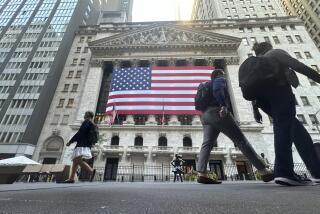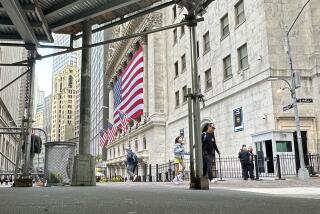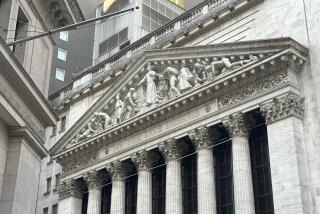BofA, Alcoa and HP are ousted from Dow Jones index
NEW YORK — The stock market’s all-star team has some new players.
Leaving the Dow Jones industrial average is aluminum giant Alcoa Inc., computer-maker Hewlett-Packard Co. and financial behemoth Bank of America Corp. Joining the index of 30 blue-chip companies are investment bank Goldman Sachs Group Inc., payments company Visa Inc. and apparel giant Nike. The big switch happens Sept. 23.
“Symbolically it’s a big deal,” said Jeffrey Hirsch, editor in chief of the Stock & Commodity Trader’s Almanacs. “It’s kind of like an honorary diploma once you’re president.”
Dow shake-ups are not unheard of — UnitedHealth Group Inc. replaced Kraft Foods Inc. last year. But changing three companies at once amounts to the biggest change in a decade.
The moves are unlikely to significantly hurt the three companies bounced from the index, experts said. Alcoa and HP’s shares edged only slightly lower on a day when major U.S. indexes — and even BofA’s stock — all rose nearly 1%.
And although some experts suggested that swapping in higher-priced stocks might make the Dow less volatile, it has little tangible influence among Wall Street’s professional investors.
Only six mutual funds, collectively worth $196 million, are benchmarked to the Dow, according to Morningstar Inc. Meanwhile, 1,323 mutual funds, collectively worth $2.9 trillion, are pegged to the broader Standard & Poor’s 500 index, according to data provided by Morningstar.
The Dow and S&P 500 are up 16% and 18%, respectively, for the year.
Founded by Charles Dow in 1896, the Dow Jones industrial average initially comprised only 12 companies. Among them were long-forgotten names: American Cotton Oil, Distilling & Cattle Feeding and Tennessee Coal & Iron. The only remaining original Dow member is General Electric Co.
Dow published the index in the Wall Street Journal, which he co-founded, as a way of “watching and determining the flood tide of the stock market,” he wrote.
More than a century later, the Dow index has become the most widely recognized yardstick for how well U.S. stocks are performing.
“That’s what comes to people’s mind,” Hirsch said. “The Dow up 100 points, down 100 points — that’s how people think of the market.”
Membership in the Dow is overseen by a committee of S&P Dow Jones Indices executives and top Journal editors. The committee meets at least twice a year.
Criteria for companies are subjective. A Dow member must have an excellent reputation and demonstrate sustained growth as well as be of interest to a large number of investors.
In this case, the three companies booted from the Dow collectively accounted for only 3% of the index’s value, said David Blitzer, chairman of the Index Committee.
“To spend three positions on 3% seemed a little bit silly,” he said.
So the committee considered about 10 companies to add to the index, Blitzer said. For months the committee had heard complaints about Alcoa’s continued inclusion in the Dow given its sagging stock price ($8.06 as of Tuesday’s close), he said.
“We improved the balance to some extent,” Blitzer said. “The weights are a little less skewed than they were.”
Another aim was diversity. Bank of America — whose stock is up 26% this year but still off 55% from its price five years ago — has a business model similar to Dow member JPMorgan Chase & Co.
Goldman Sachs, by contrast, is an investment bank without a retail banking operation, and its $165.14 stock price helps balance the index, Blitzer said. Nike became the Dow’s only apparel and shoe company.
Unlike the S&P 500, the Dow is an index weighted by stock prices. That’s what has helped keep out tech giants Google Inc. (Tuesday share price: $888.67) and Apple Inc. ($494.64).
Google alone would account for nearly 30% of the Dow’s value had it been included earlier, according to Blitzer. “That’s a little big,” he said. “Whatever Google did the index would do.”
Companies ejected from the Dow downplayed their removals.
BofA, which was added to the Dow in 2008 and has been trying to turn itself around since the financial crisis, said the decision “has no impact on our business or our strategy for providing solid returns to shareholders.” The bank noted it was the leading performer in the Dow last year, and that its market value has nearly doubled over the last 12 months.
Alcoa, a Dow member since 1959, said, “We are focused on the things we can control, pressing our innovation edge and strong position in end markets, while lowering our cost position in our commodity business.’’
A Goldman spokesman said he wasn’t aware of any events marking the bank’s inclusion.
“We are pleased to join this historic and significant market benchmark, and remain dedicated to delivering value for our shareholders as a member of the Dow 30,” Goldman said in a statement.
More to Read
Inside the business of entertainment
The Wide Shot brings you news, analysis and insights on everything from streaming wars to production — and what it all means for the future.
You may occasionally receive promotional content from the Los Angeles Times.









